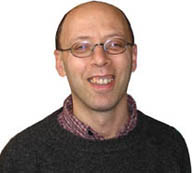AROUND THE QUADS
5 Minutes With ... Gil Eyal
Associate Professor of Sociology Gil Eyal is the department’s director of undergraduate
studies and won one of the first annual Distinguished Columbia Faculty Awards. He earned his B.A.
at Tel Aviv University and Ph.D. at UCLA, joining the Columbia faculty in 2002 after teaching at UC
Berkeley. CCT caught up with him after class to learn more.
Q: What was it like to come to Columbia and NYC after Tel Aviv and Los Angeles?
A: It proved much better than I thought. Beyond my expertise, New York and Columbia are both centers for
the Middle East. The range of people you meet and intense discussion of issues is very good.
Q: Where do you live?
A: Forest Hills.
Q: Do you have any pets?
A: A dog, Mickey. I worked in a dog shelter; my wife took
pity on me and we adopted him in Berkeley.
Q: What is the best thing about New York?
A: The proximity to Israel and my wife’s
family.
Q: What is the worst thing about New York?
A: The traffic and parking.
Q: What classes did you teach this semester?
A: I’m teaching an undergraduate
class, “Classical Social Theory,” a required course
for majors and concentrators, and a graduate class, “Sociology of Expertise.”
Q: You’ve been called an expert on expertise. What exactly is
your expertise?
A: I have a research program on expertise that is funded by the Columbia Institute for Social and Economic
Research and Policy. Expertise implies a relationship between knowledge and certain forms of power.
Our society is a society of experts. In the last 20–30 years, there has been a shift in
the politics of expertise, such as the issue of autism. Parents become experts and contest the experts
and suggest alternatives. That is one phenomenon in the changing culture of expertise — medical,
law, psychology and criminal experts have been challenged.
Q: Tell us about your new book, The Disenchantment of the Orient: Expertise in Arab Affairs
and the Israeli State.
A: In the ’20s, ’30s and ’40s, the expertise
in Middle Eastern studies was “Orientalist,” but
precisely for that reason, it located Jews and Arabs close together as Oriental. Now, expertise has
become separatist — fractioning of expertise, separating Arabs and Jews, knowledge about inside
Israel and outside Israel. All solutions are now envisioned in terms of separation.
Q: What’s new in the sociology department?
A: We’ve given a lot of thought
to revising the major for undergraduates, such as a yearlong course in burning issues of American society
(religion, racism, abortion, etc.) taught by senior faculty. We’ve placed a lot of emphasis on
the senior thesis, encouraging a yearlong thesis seminar, to develop capacity for reasoning and thinking.
Q: What are your plans as director of undergraduate studies?
A: The course about
burning issues, and I would love to have a sociology club. I’ve spoken
with students about enrolling in the International Sociology Honor Society.
Q: What are you reading now?
A: I’m reading a book called Constructing
Autism. My literary reading
list has been curtailed by work. The last novel was about autism, too.
Q: What is the last movie you saw?
A: Citizen Kane. I’m the kind
of creature who sees movies way more than one time.
Q: What is your favorite vacation spot?
A: California, probably Santa Barbara. We
used to go there all the time.
Q: What did you want to be when you were a child?
A: That’s easy. At age 4
or 5, I wanted to be a paratrooper. I climbed up on the table and jumped down, climbed up and jumped
down. Then later I wanted to be a historian, then a physicist, but I always wanted to be at a university.
Q: Once the paratrooper was out of your system ...
A: I was a paratrooper — I
parachuted six times in the Israeli army and got it out of my system. It’s not something I want
to do again.
Q: If you were not teaching, what would you be doing?
A: It’s difficult to
envision doing anything non-academic. I’d probably try to write a novel.
Interview and photo: Laura Butchy ’04 Arts
|




